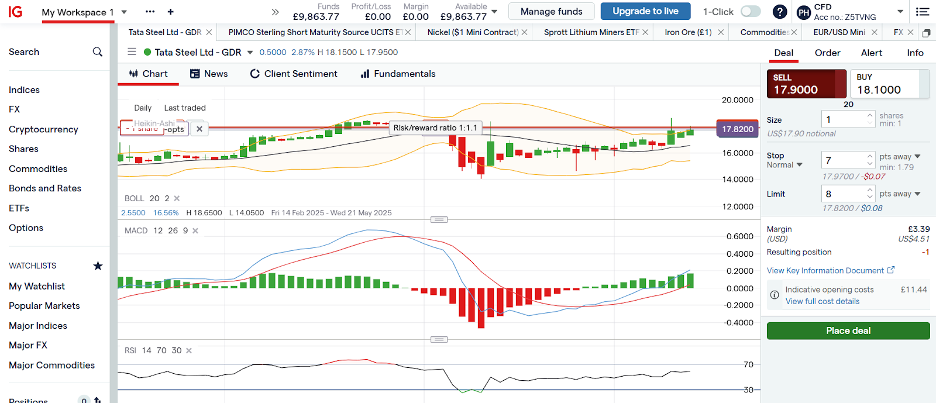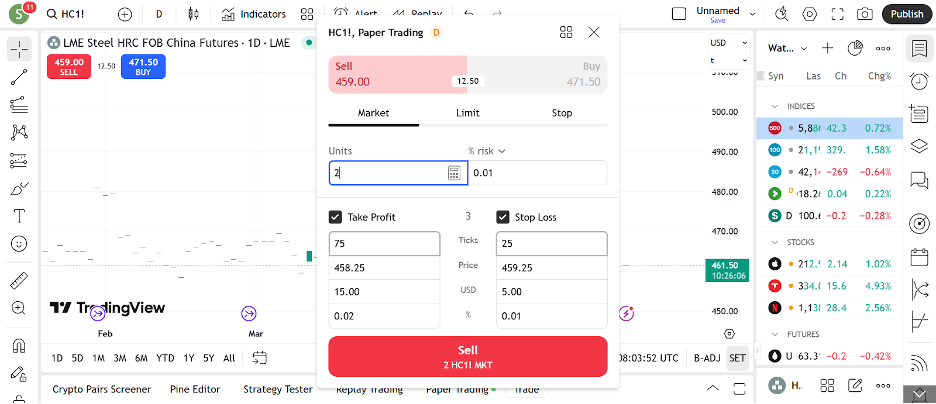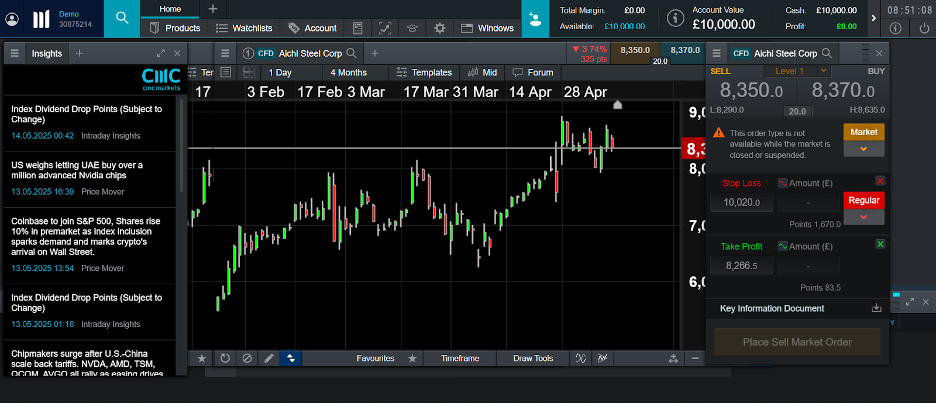Best Steel Brokers 2026
We’ve thoroughly tested and ranked the top steel brokers for 2026, combining hands-on analysis with extensive data.
-
1Established in 1989, CMC Markets is a reputable brokerage firm authorized by various top regulators such as the FCA, ASIC and CIRO, and is listed on the London Stock Exchange. They boast a global client base of over 1 million traders and have received numerous awards.
-
2
Trust Platform Assets Fees Accounts Research Education Mobile Support 4.0 FP Markets, founded in 2005 in Australia, is a trading broker regulated by ASIC and CySEC, offering a wide variety of tradable assets. It provides Standard and Raw accounts suitable for all types of traders. It also offers comprehensive trading tools, including the MetaTrader suite and TradingView along with useful trading suggestions from Trading Central and AutoChartist.
Compare the Best Steel Trading Brokers by Core Features
We evaluated each steel broker across the metrics that matter most. Here’s how the top providers compare:
How Secure Are the Top Steel Trading Platforms?
When trading high-value commodities like steel, security is paramount. See how leading brokers safeguard your capital:
Best Steel Trading Apps for On-the-Go Traders
We tested mobile platforms for steel trading, focusing on speed, stability, and functionality. Here’s how the top providers scored:
Are The Best Steel Brokers Good For Beginners?
Just entering the steel market? These platforms offer intuitive interfaces, helpful tutorials, and supportive learning environments:
Are The Best Steel Brokers Good For Advanced Traders?
See which top steel trading platforms offer pro-level features like deep liquidity, advanced order types, and high-speed execution:
Accounts Comparison
Compare the trading accounts offered by Best Steel Brokers 2026.
Steel Broker Ratings – Our Complete Scorecard
Dive into the full ratings breakdown for the highest-performing steel brokers, based on our tests and expert reviews:
Trading Fees Compared – Where’s the Best Value?
We analyzed spreads, commission structures, and hidden charges to find brokers offering the most competitive pricing for steel traders:
Most Popular Steel Brokers Among Active Traders
Want to know which brokers steel traders are choosing? These platforms are attracting the most clients:
| Broker | Popularity |
|---|---|
| CMC Markets |
|
| FP Markets |
|
Why Trade With CMC Markets?
CMC Markets offers a great online platform for traders. It has advanced charting tools and a wide variety of CFDs to trade, including a large selection of currencies and customized indices. It caters to traders at all levels.
Pros
- The brokerage excels by offering various useful resources. These include scanners that identify trading patterns, webinars, tutorials, updates from news outlets, and research from esteemed companies like Morningstar.
- CMC provides great pricing, with narrow spreads and low fees for trading except for stock CFDs. The Alpha and Price+ programs also give benefits to active traders, including up to 40% spread discounts.
- CMC Markets is strictly overseen by respected finance entities, helping to ensure safe and reliable trading. Its excellent reputation ensures a secure trading environment.
Cons
- Trading stock CFDs carries a comparatively high commission charge, particularly when contrasted with more affordable brokers such as IC Markets.
- CMC provides a commendable range of assets, but lacks support for actual stock trading and UK customers are unable to trade cryptocurrencies.
- The CMC Markets app provides full trading services, but its design and user experience are not as good as leading competitors such as eToro.
Why Trade With FP Markets?
FP Markets offers a great combination of reasonable pricing and quality services for traders. They maintain affordable trading costs, along with growing their investment options, analytical tools, and research capabilities. Additionally, they provide top-notch support for urgent trading concerns.
Pros
- FP Markets offers a smooth sign-up process, notable for accepting cryptocurrency and more than 10 base currencies. It is suitable for traders worldwide.
- FP Markets uses advanced tools from Trading Central and Autochartist. These tools assist traders in spotting short-term trading possibilities using patterns, indicators, and other technical elements on charts.
- FP Markets provides reliable support 24/5, usually responding within one minute based on tests.
Cons
- FP Markets, with 130 available trading options in their MT4 Trader's Toolbox, doesn't match the top MetaTrader brokers, particularly when compared to Pepperstone's 1,300 assets. This may limit opportunities for dedicated traders.
- The pricing in the Raw account is great, but the Standard account isn't as competitive. It has a higher average spread of 1.1 pips on EUR/USD trading, whereas IC Markets averages at 0.8 pips.
- The Iress platform from FP Markets is exclusively for Australian clients. It mainly focuses on stock trading more than forex trading. Data costs can quickly add up if you're not an active trader or if you don't have a high-end account.
Filters
How We Found the Best Steel Brokers
To create this list, we analyzed platforms that offer steel trading through CFDs, futures, and other trading products.
Our custom-built scoring model draws on over 200 data points across eight key areas – spanning platform reliability, cost-efficiency, toolsets, regulatory protection, and more.
We didn’t stop at data. Every broker was tested by our experienced team to assess usability and market access – so you get unbiased insight based on actual performance, not just promotional claims.

What to Look for in a Top Steel Broker
Over years of platform testing, these are the critical elements we’ve found to separate top-tier steel brokers from the rest:
Market Access: Get the Right Exposure to Steel Markets
Market access is the first box to tick when you’re looking for a steel broker. It might sound obvious, but not all brokers give you the same reach.
You need to know what kind of exposure you’re after; whether it’s direct trading in steel futures on exchanges like the London Metal Exchange (LME) or Chicago Mercantile Exchange (CME), or synthetic exposure via ETFs and CFDs that track steel prices or the broader metals sector.
If your broker doesn’t offer access to the right products, it won’t matter how great the platform is or how low the fees are. You’ll be locked out of opportunities.
We’ve tested this ourselves by setting up demo trading accounts, checking available markets, and digging through product lists. And from our hands-on experience, the gaps can be surprising.
Some brokers offer only indirect exposure through mining stocks or general commodities ETFs. Others might give you CFDs, but no futures. So it’s not just about whether they say they offer steel, it’s about how.
Top Pick: After these evaluations, IG clearly stands out when it comes to steel market access. They offer a substantial range of options, from steel futures listed on major exchanges to steel-related ETFs, synthetic CFDs, and specific steel stocks like Tata Steel.
IG gives you flexibility whether you’re a short-term trader looking to take advantage of price moves or a longer-term investor wanting exposure to the steel sector.

IG’s web platform is a breeze for finding steel-related trading instruments
Steel-Specific Research and Insights: Quality Info Matters
Good market access is only part of the equation. If you’re serious about trading steel—whether through futures, ETFs, or CFDs—you need a broker that backs up their platform with proper research.
We’re not talking about general market commentary or a once-a-month newsletter. We mean focused insights: steel production trends, updates on global mining activity, and how geopolitical events impact major producers like China, India, and Japan.
From our perspective, this is where many brokers fall short. We’ve reviewed the research sections across multiple platforms, and much of it is too broad or outdated.
If your strategy depends on understanding supply chain bottlenecks or shifts in export policy from key Asian producers, a daily market summary isn’t going to cut it.
Top Pick: CMC Markets impressed us in this area. Their research coverage is sharp and regularly updated, with a solid focus on commodities.
We found steel-specific commentary in their Insights section built into their broader metals analysis, which often touches on mining disruptions, manufacturing demand, and macroeconomic trends tied to steel output in countries like China and India. The level of detail shows they’re paying attention to the whole picture, not just price charts.
Execution Speed and Reliability: Don’t Let Slippage Eat Your Edge
Steel markets can move fast, sometimes in a matter of seconds, especially when macro news hits or inventory reports surprise the market.
When that happens, you need your broker’s execution speed to keep up. Slippage, lag, or platform downtime can turn a well-timed trade into a missed opportunity or worse, a loss.
We’ve stress-tested platforms during busy trading hours and around significant news releases. Our goal was simple: place trades fast, get filled at expected prices, and not worry about glitches.
Some platforms struggled during high-volume periods, and even a few seconds of delay can matter when you’re trading commodities like steel.
Top Pick: FP Markets stands out here. Their execution, through platforms like MT4/MT5, cTrader, and TradingView, is fast and stable, even during peak market hours. We placed multiple test orders on TradingView, both market and limit, and consistently experienced sharp, on-point execution without any significant slippage.
Their infrastructure feels built for active traders, and they’re transparent about order handling, which adds an extra layer of trust. If you’re trading short-term steel price movements, execution speed isn’t just nice to have; it’s essential. FP Markets gets this right.

FP Markets offers TradingView, one of the slickest platforms for trading steel
Data Feeds and Charts: See What the Market Sees
Steel trading isn’t just about instinct. You need factual data—live pricing, real-time inventory updates, and charts that help you spot trends before the rest of the market catches on. Access to LME or CME steel pricing is non-negotiable.
So is being able to overlay technical indicators, analyze historical patterns, and watch how global inventory levels are shifting.
Some brokers only provide delayed data or limited charting features unless you pay extra. We tested what’s available straight out of the box and how valuable the tools actually are for steel-focused trading.
Top Pick: Here, IG Markets earns another mention. Their platform includes live pricing for major commodities, including steel-linked instruments and popular ETFs, and offers pro-level charting tools that go far beyond the basics. You can run multi-timeframe analysis, add a wide range of technical indicators, and even integrate economic news directly onto your charts.
We particularly liked how easy it was to track LME data and metals-commodities news alongside technical levels; it gave us confidence to act quickly when signals aligned with inventory trends.
Margin and Leverage Options: Know the Costs, Control the Risk
Trading steel—whether through futures or leveraged CFDs—means working with margin. That’s not a bad thing. Leverage can help you amplify opportunities, but it also ramps up your exposure.
So, you need precise, competitive, and transparent margin terms. No surprises. No vague explanations. Just straight-up info on how much you’re required to post, what your max exposure is, and how margin calls are handled.
We’ve reviewed margin structures across different brokers by checking both their listed terms and how those terms play out in live and demo environments. A few were overly complex or buried in fine print.
Top Pick: FP Markets offers some of the cleanest, most trader-friendly margin setups we’ve encountered. Their leverage options for commodities are flexible, and more importantly, they’re upfront about the risks. You’ll find detailed breakdowns by product type, including what’s required for CFDs tied to steel ETFs or futures indexes.
When we ran our own simulations using typical steel exposure scenarios, FP Markets consistently provided reasonable margin requirements without forcing you to overextend.
Regulatory Oversight and Broker Credibility: Trust Matters in the Steel Space
Steel isn’t your average asset. You’re often trading against macroeconomic noise, political uncertainty, and unpredictable supply disruptions.
That makes the credibility of your broker even more important. You want someone with a solid history in commodities, regulated in strong jurisdictions, and with a reputation for treating clients fairly.
We’ve investigated each broker’s regulatory profile and reputation within the metals trading community, including user feedback, platform transparency, and how they handle trade disputes or system issues.
Top Pick: CMC Markets is the standout in this category. It’s regulated by top-tier authorities like the FCA (UK) and ASIC (Australia), and it’s built a long-standing reputation in commodities, especially metals.
We’ve had direct experience with its support team during test runs, and the responsiveness and professionalism were exactly what we’d want if real money were on the line.

CMC features an intuitive platform for trading steel instruments
Fees and Commissions: Keep More of What You Earn
Steel trading margins can be thin, especially if you’re active and taking multiple positions weekly. That’s why your broker’s fee structure matters more than you think. Even slightly wider spreads or hidden commissions can erode profitability over time.
We’ve seen it ourselves when testing out trades: a 1-point difference in spread might not sound like much, but over dozens of trades, it adds up.
When comparing brokers, we looked at both the published fee schedules and how pricing behaved in trading conditions—during regular markets and periods of higher volatility.
Top Pick: FP Markets stands out again here. Their spreads on steel-related CFDs and commodities ETFs are consistently tight, and they’re transparent about commissions or rollover costs.
There’s no second-guessing or digging around in footnotes. Everything is laid out clearly. This matters because when you’re planning your trades, especially short-term ones, you need to know exactly what your costs are.
Risk Management Tools: Stay in Control When Steel Gets Volatile
Steel prices don’t always move gradually. One day of geopolitical tension or unexpected production cuts can send prices spiking or crashing. That makes risk management tools non-negotiable. You need to be able to cap your losses, get notified of key price levels, and react quickly when volatility ramps up.
We went hands-on to test what tools brokers actually provide, not just what’s advertised. We looked for stop-loss and take-profit functionality, price alerts, trailing stops, and platform features that help you monitor volatility. A lot of platforms tick the basics, but few give you the depth and usability that serious steel traders need.
Top Pick: IG comes out ahead in this area. Their platform is packed with advanced risk tools, including guaranteed stop-losses, custom price alerts, volatility filters, and comprehensive exposure reports. When we tested different setups across steel-related instruments, we found the tools easy to configure and responsive in live conditions.
You also get real-time notifications when market conditions shift sharply—something we appreciated during steel inventory report days. It’s clear IG built their platform with active traders in mind. IG gives you the right toolkit if you want to protect your downside while still staying flexible in fast-moving steel markets.

